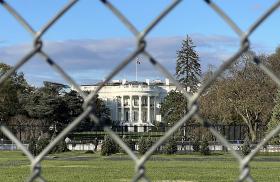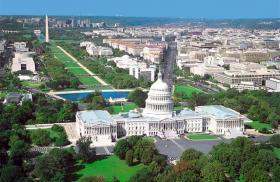- Policy Analysis
- Policy Alert
Israel and the Houthis Are Entering a Dangerous Escalation Cycle
Despite their confident saber rattling, both sides face real constraints that could impede their operational goals, and their actions increase the risks to maritime security, energy exports, and broader regional stability.
Festering hostilities between Israel and the Yemeni Houthis saw another significant shift over the past week. On August 28, an Israeli airstrike in Sanaa killed at least twelve members of the Houthi-controlled government, including the prime minister, and critically injured many others (though the degree to which these ministers were actually affiliated with the group is complicated, as will be discussed below). In response, the Houthis appointed an acting prime minister, organized a massive funeral for the slain officials, and continued their barrage of missiles toward Israel, none causing damage, but one of which carried a cluster bomb warhead (only the second reported use of this weapon). They also fired a missile at the Israeli-owned chemical/oil tanker Scarlet Ray on September 1 as it was sailing near Saudi Arabia’s Red Sea port of Yanbu—an area that is outside the group’s normal range for maritime attacks and dangerously close to critical energy export facilities. A day later, they claimed a drone and missile attack on the Liberian-flagged container ship MSC ABY in the northern Red Sea, which is still unconfirmed as of this writing.
Israel’s decision to target the government seems predictable in hindsight. Relying in part on support and arms from Iran, the Houthis have been attacking Israeli territory and commercial shipping in the Red Sea under the banner of “defending Palestine” since the Gaza war began in 2023. Israel held its fire for months until July 2024, when a Houthi strike resulted in a civilian casualty. Since then, Israeli forces have bombed infrastructure in Houthi-controlled areas, targeting the Red Sea port of Hodeida, Sanaa airport, power stations, and fuel facilities.
The decapitation of the Houthi-controlled government is a dramatic reminder of Jerusalem’s determination to strike back at the most active branch of Iran’s “axis of resistance” and deter future attacks. The operation was enabled by Israel’s stepped-up intelligence gathering in Yemen, which reportedly includes a new unit of 200 intelligence personnel. Fearing such penetration, the Houthis have amplified their internal crackdown efforts since the strike, targeting perceived spies and internal dissenters. They even raided UN facilities in Sanaa, detaining at least nineteen staff. Going forward, the incident will almost certainly push the Houthi leadership further underground, slowing the group’s communications and possibly interfering with the frequency and lethality of its attacks.
Yet the Israeli operation is also notable for what it did not do. None of the confirmed dead were Houthi military or political decisionmakers. In fact, the majority of these officials—including the prime minister and foreign minister—were not part of the Houthi movement at all, but Yemeni politicians and technocrats who hailed from various parties and regions and had no adherence to Houthi ideology. In effect, the Israelis eliminated a largely figurehead government. Moreover, some of those killed and injured were individuals who could have communicated with and influenced the Houthis if negotiations to end Yemen’s civil war ever resume. In conversations with the author, Yemenis have expressed concerns that the Sanaa strike will work to the Houthis’ advantage, facilitating their internal crackdown and unifying residents in opposition to a common Israeli foe. Meanwhile, efforts to target the core Houthi military and political leadership will likely become even more difficult given their growing wariness and decades of experience hiding in the north.
The immediate trajectory seems to be mutual military escalation. The Houthis have threatened revenge and declared that they will continue their attacks, while Israeli officials warned that this is only the start of a campaign against the group’s leadership—one that could continue even if the Houthis follow through on their promise to halt attacks once a ceasefire is reached in Gaza.
The targeting of a ship off the northern Saudi coast is a particularly worrisome step. If it proves to be the start of a Houthi campaign in parts of the Red Sea that were previously deemed safe, it would seriously challenge the group’s detente with Saudi Arabia, which the kingdom is keen to maintain. Clearly, the group’s leaders are sending a message to Riyadh that they will escalate if they are squeezed further.
Despite their confident, even arrogant, saber rattling, both the Houthis and Israel face real constraints. If Israel continues striking leadership and infrastructure targets, it will present logistical challenges to Houthi military operations. Killing key leaders could even destabilize the group and loosen its grip on northern Yemen, though this effect would likely be temporary—after all, the factions that compose the internationally recognized Yemeni government are deeply divided and at times more inclined to fight each other than the Houthis, so they are hardly positioned to reassert control in the event of further Israeli decapitation strikes. For its part, Jerusalem will have to deal with the budgetary and logistical challenges of sustaining military operations in a country over 2,000 kilometers away, particularly amid a long list of other regional priorities (though it may see benefit in terms of obtaining operational experience and telegraphing its capabilities to Tehran). Moreover, airpower alone—even a brutal application that targets critical infrastructure—will not halt Houthi attacks or dislodge the group from power. In short, both sides appear to be entering a dangerous period of escalation whose only guaranteed outcome is more suffering for civilians and increased risks to maritime and regional security.
April Longley Alley is a senior fellow at The Washington Institute and former senior political advisor to the UN special envoy for Yemen.



